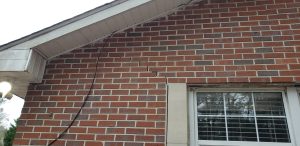Getting the inspection before the showings will cost you several hundred, and it will help you disclose the material defects of the home. Even in a HOT seller’s market, about one in three offers fail to make it to the closing table. One of the biggest reasons that offers fail to reach the closing table is because of what is revealed during the inspection process. (For other reasons, check out our article here).
Buyers lose faith in the sellers when they find something BIG on the inspection report that was not previously disclosed. You can keep this from happening to you by getting a pre-listing inspection. If something big is found, before you are under contract, you have more options as a seller.
Once you have accepted an offer, the buyer has two weeks to complete their due diligence and inspect and investigate the home. The buyer is not required to hire a licensed inspector, but most do.
The inspector needs to be able to view all areas of your home. Because of this, it can take a lot of time for the seller to prepare for the home inspection. Remember, you plan to sell and move anyway. Remove everything underneath the sinks. Thin out the closets and leave room to see the walls and floor.
Here’s what we think sellers should know about inspections.
How to Prepare for a Home Inspection
The best way to cost yourself money and years of heartache in court is to conceal defects, including ‘bad’ inspection reports. There is no such thing as caveat emptor in real estate anymore. Here’s how a seller can prepare for their home inspection.
You want all systems tested. Leave the power on, and if you have had the gas turned off, contact the gas company. They will have it turned back on within 24-48 hours in most cases.
Check all light switches and replace burned-out bulbs. Don’t forget to check outdoor lighting as well! If the lights are not working properly, the inspector notes it in the report. He will state that it may be a light bulb or an electrical issue. This note can scare a buyer, so it is best to address it before the inspection.
Make sure there is nothing in front of the electrical panel. The inspector will remove the panel from the wall and take pictures of the wiring. This is too dangerous to do while leaning over or reaching around something.
Remove enough items from the garage for the walls and floors to be inspected for cracks and water penetration. We once found a live termite infestation during the final walk-through on a previously concealed wall in the garage. That cost the seller a lot of aggravation, time, and money. Please do not be that seller.
If there is access to the attic in a closet, make sure it is accessible. This includes making sure the rungs are sturdy if you have drop-down stair access. If you have a ceiling scuttle hole, the inspectors will have a small ladder they can use to access it.
Please change the filters for your air conditioning system and leave any service tags so the inspector can see them. Clean the vent covers in each room. Also, replace any rusted covers.
During the Sellers Home Inspection
It is the inspectors’ job to find defects, and they will find defects. There is no perfect home.
You can stay and ask questions.
Home inspections can last a couple of hours. The inspector tours the home with a flashlight and camera and some other fancy cool equipment too. He will test all the outlets and light switches and appliances.
The inspector will put on a bug suit and drag himself into crawl space too (if he fits). He will measure the heat in the attic and in the air vents that heat or cool the rooms.
If you opt for a radon test, the radon measuring machine is placed in the home for several days. Do not leave windows or doors open during the test. Please do not move out during the testing. This would make the test useless and cost you the inspection money and time during the inspection period.
What the Seller Should Expect the Inspector Inspects
There are seven major things that home inspectors look for:
- Damaged Roof – some inspectors will not walk on the roof. Honestly, it is not good to walk on a roof anyway, but your inspector should look at the wear and tear of your roof. How much asphalt is left on the shingles? How are the flashings holding up? Any sign of water penetration into the house? Does it have a proper vent to keep temperatures down in our brutal summers?
- Water Damage – can happen anywhere or seem to anyway. Undetected leaks can cause MAJOR and EXPENSIVE damage. Water is also an invitation to critters to make a home in your walls and foundation.
- Structural Issues – this would include things like stair-step cracks near doors and windows and wide settling cracks. While some cracks are minor, the inspector will tell you when to seek more advice.

This brick house had the foundation fail. This crack above the window was the tell-tale sign that there was a foundation problem. This was a $20,000+ repair.
- Damaged Electrical System – The electric panel should be well organized and labeled. There should not be scorch marks anywhere near electrical sources. The inspector will check the arc interrupters too and make sure they function as they should.
- Plumbing Problems – While lead pipes are not common in our part of Florida, we do see polybutylene pipes here. They are also looking for leaks and signs of water penetration.
- Insect and Pest Infestation – Critters leave evidence behind. If there is an active infestation, as a seller, you will want to deal with it immediately. Even if you decide not to move, critters need to be removed to protect your home.
- Issues with the HVAC System – The inspector will measure the temperature of the air coming from the vents as far away from the condensing unit as he can go. The inspection report will include what the temperature differential is and what that means. If it is too big, they suggest you have your system serviced.
After the Inspection
Even if disclosing the defect costs money, as the seller you MUST disclose EVERY and ANY known material defect. The buyer’s home inspector will find it anyway, and you weaken your negotiating leverage when they do. Many buyers will walk away after inspections if they feel the seller was not honest with them anyway.
If something major is found, it is better for you to have found it before the buyer. You now have the choice to address it or disclose it and leave it for the buyer. Some buyers prefer to have their own contractors do the work. Getting quotes will help a buyer make their own decision on what the repair/remodel is worth in the asking price.
Some loans require repairs to be completed before a loan can close. Experienced Realtors can tell you which repairs a lender may require.
If you are considering selling, we would love to hear from you. Contact me at 850-203-0209 or [email protected]


